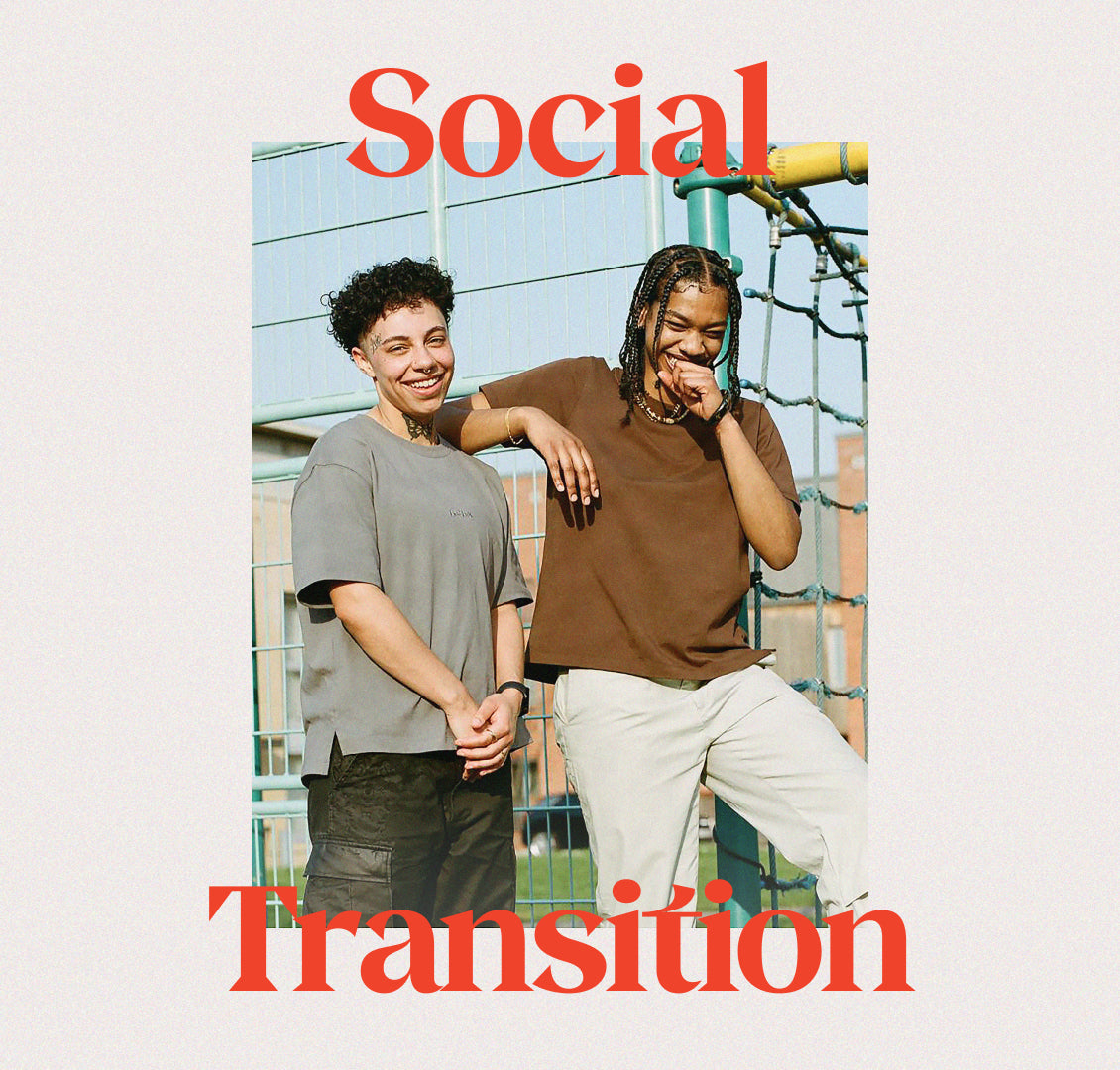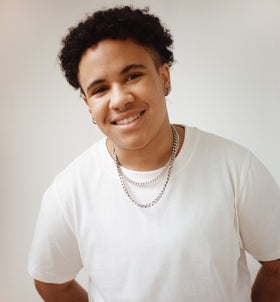
Aug 6, 2024
Social Transition
Finnegan Shepard Founder of Both&
Maybe you are a parent doing research after your child told you they think they might be trans. Maybe you are researching for yourself, wondering whether you might be trans, nonbinary, or gender queer. If you are beginning to look into the topic, then you will quickly come across different kinds of transition:
- Medical transition
- Legal transition
- and social transition.
Google will provide you plenty of clean, concise definitions of what these forms of transition mean. But while these definitions are helpful as a grounding point, they can be a bit clinical. Sometimes what you need most is to feel seen and reflected in other people’s experiences. You want to know that the confusing feelings and thoughts you are experiencing are in fact totally normal and okay.
The best way to do that is to read other people’s stories. In this essay, we will explore social transition through a narrative-focused lens. We hope this can provide some insight and comfort.
“I was twenty eight. I thought it was ‘too late’ for me to be trans.”
Rocco grew up in Indiana. As a kid, he was allowed to wear boy’s clothing and rejected traditional gender roles. He played sports with his older brothers and hated all things he deemed as ‘overly feminine.’
But this was also the nineties, and his world was split into male or female. “In the united states at that time, and especially in the midwest, gender transition wasn’t something that was really talked about. All of the nuance now, of the distinction between binary people and folks who identify as transgender or nonbinary or gender queer—that just wasn’t around for me.”
Rocco had quite a happy childhood. In his community he was labelled a tomboy, and while the term never felt quite accurate, it felt better than the alternative. He did well in school and ended up getting a scholarship to a prestigious east coast university. It wasn’t until well after university, when we was working in Boston, that he met someone that would shift everything.
“It was a total fluke. I never go out dancing or to the bars. But my friend had just graduated from her PhD program and she really wanted to go to this queer club, so we went.
I met Katy that night. Katy is...extraordinary.
She’s a trans woman, and she’s just the most self possessed person I ever met. We actually fooled around for a little bit at the very beginning, but I think that was kind of me mistaking my adoration for who she is and how confident she is into attraction. Now we are just the best of friends.
But she’s been there for all of it. She was the first person to start calling me by my chosen name, and she was literally perfect about pronouns. Not only did she always use he/him with me, but she was great at gently correcting other people when I started my social transition.
She didn’t make it awkward or weird, she just corrected them and we moved on. She was there when I changed my birth certificate. She was there when I started hormonal treatment. She was the person who told me I was a total idiot for thinking it was too late, that I had ‘missed’ my chance.
I guess I thought that if you were trans you had to do it when you were young. Those were all the stories I was seeing online, and I just sort of believed it. But she showed me that there isn’t a right or wrong way to be a transgender person, or to transition. We all do it at the time that is right for us, and there are so many factors that go into that.”

“Everything changed after I was able to get gender affirming surgery.”
Wes was born and raised in Los Angeles, and grew up as a Gen Zer very much aware of gender queer identities. “I feel like half the people I grew up with fit somewhere under the umbrella term of queer.“ Throughout high school, Wes identified as nonbinary.
“That was really the social transition, for me. It wasn’t a surprise to anyone, but when I started going by Wes and using they/them pronouns, it was a shift. At that stage I didn’t think I would ever want any kind of medical treatment.
I very much vibed with the whole ‘gender is a construct thing.’ I hated terms like ftm or afab (assigned female at birth) because I thought gender was made up so what did it matter?
Then life changed. I went to college, and started working at a queer bar in Eagle Rock. I noticed that when folks at the bar misgendered me and called me ‘sir’ or ‘he’ I would have this little flicker of happiness in me. I started using men’s restrooms more often. It always felt elicit, like this thing I wasn’t meant to do. That was fun, but it was also scary.
I started noticing it when people did double takes of me. I’m 5’4“, so I’m pretty short. I was presenting quite masc, but I still think that is was 50/50 as to how people read me. That ‘second’ social transition was more organic. It just happened. I didn’t start talking about myself as a trans man. My friends and family just naturally shifted to he/him pronouns, I started presenting as more masc day to day.
And then a few years later, I started T. That was wild. Suddenly my muscles were growing and my voice dropped. I developed this peach fuzz on my upper lip. It was suddenly like—oh wow, this is what feeling totally embodied feels like??
For whatever reason, I was never attracted to top surgery. Even after starting T, top surgery just didn’t feel like the path for me. I have a really small chest, so that’s definitely a privilege/part of it. But interestingly, the medical procedure I started feeling really drawn to was a beard transplant. I didn’t like the peach fuzz look, I really wanted a full, healthy beard.
So I saved up, and eventually flew out to NYC to get the procedure done. Healing from that was definitely pretty gnarly, but I was so, so happy with the results. Now I finally feel this total alignment between my gender and how I present to the world.”
“When Mom called me ‘she’ for the first time I cried with joy.”
Cassandra is sixteen, and still lives at home with her parents. She was assigned male at birth but her earliest memories are of identifying with everything she deemed ’feminine’ around her.
“If I saw my sister playing with a toy, I had to play with it. I think Mom and Dad thought I was just a super greedy kid that couldn’t share. But actually it was just like, if she had it, then it represented what girls wanted. And I wanted them to see me as a girl, too.“
Cassandra (who sometimes goes by Cass), was very vocal with her parents from a young age about her identity. She would get upset when she wasn’t allowed to wear the same clothes as her sister or when her Dad pressured her to join the baseball team. Neither of Cassandra’s parents knew anyone who was trans, and they hadn’t been exposed to much positive presentation around it.
When Cass was in fourth grade, her mother stumbled across an article called ’How to Support Your Trans Kid.’
“I still don’t know why I clicked on the article. Instinct, I guess. It wasn’t like the term ‘trans’ had ever been spoken in our household.
Reading the article I felt like I needed a dictionary. Amab? Mtf? Sex assigned at birth? I had no idea what all these trans women they had interviewed were talking about. But it sparked something in me. I remember googling ’what do I need to know about transitioning?’”
Cassandra’s parents say that it was definitely a slow and challenging process for all of them. They started reading books, and they joined a local support group for parent’s of trans kids. They weren’t even sure if Cassandra was trans--to this day, Cassandra is still exploring her gender identity and what feels most comfortable to her.
“I’m not sure what the future holds. Maybe I will medically transition, maybe not,” Cassandra says when asked about the future.
“But being given the space to socially transition at such a young age was like, uber helpful. My school has been really supportive. The kids don’t bully me for the most part. I’m lucky.”
Concluding remarks
These are extracts from conversations with just three community members, all of whom are on different gender journeys and have different relationships to socially transitioning. For some, social transition is the first step on a path towards medical transition. For others, social transition is a destination in its own right.
Especially for younger folks who are exploring their identity, social transition is a safe, entirely reversible space in which they can feel seen and accepted as they navigate their process of finding what feels best to them.
If you would like to read more stories and essays on this topic, we recommend the following:
- Read this essay about coming out as trans.
- Learn about how clothing is a powerful tool for gender affirmation here, and what the best options for trans folks are.
- Read this master guide on transitioning, with tips, tricks, and information.



